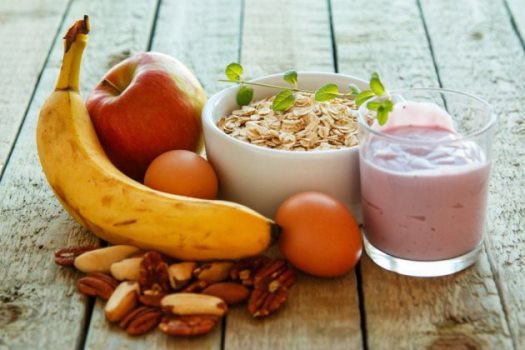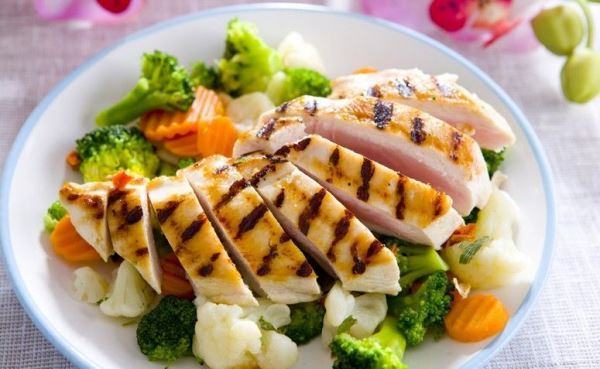What to eat before and after training? What is the best food to get energized and improve recovery after training?
Studies show that 70% of the success of a physical training is motivated by eating correct meals both pre and post training .
It is clear that food will depend on the goals and energy needs of each one, but choosing what to eat before and after training is essential for the physical effort to generate satisfactory results in our body.
A good diet, in addition to providing increased energy for better performance during exercise, helps to prevent protein catabolism , which is the loss of mass muscle.
Protein (or muscle) catabolism happens, mainly, in situations where there is little supply of energy substrates that are present in foods with carbohydrates, for example example.
Poor nutrition therefore causes protein degradation, as the body needs to use the amino acids present in muscles as an energy source, preventing them from growing.
Needless to say, this is a process that should be avoided , as it compromises the results of the entire effort.
What to eat before training?

The most suitable foods to eat before training are those with low glycemia , such as whole carbohydrates, for example, which take longer to be absorbed.
Thus, the body uses them to supply its needs without the need to remove amino acids from muscles.
In addition, for all types of workouts, whether aerobic for weight reduction or weight training for hypertrophy, carbohydrate will serve as the main fuel for muscle during physical activity , also preventing symptoms of hypoglycemia and malaise from appearing.
Protein is also important before physical activity as it is intended to provide amino acids for muscle recovery as soon as training is over.
Some good pre-workout options are toast, whole-grain bread and pasta, eggs, banana with oats, papaya with granola and fruit salad.
But be careful with the fibers. Although they are extremely important in food, if they are consumed in excess they can hinder the absorption of carbohydrates and cause gastrointestinal discomfort during training.
How long should I eat before training?
Typically, nutritionists recommend an interval of 30 minutes to an hour between meal and training.
If your training schedule is very tight and you have little time to eat before exercising, prefer lighter snacks , like fruits and breads whole grains or a glass of unsweetened natural fruit juice.
During training
Hydrate yourself ! Water lost and not replenished during training can result in dehydration and, consequently, decrease exercise performance.
For workouts over an hour, it is recommended to also drink coconut water or isotonic drinks , like Gatorade, for example.
These fluids contain mineral salts that help control the body’s chemical reactions during exercise and keep the body hydrated.
If training lasts more than two hours, replacement of carbohydrates and proteins is necessary.
What to eat after training?

After training, it is important to focus on muscle recovery . For this to happen, nutritionists recommend consuming protein-rich foods, such as chicken, fish, buffalo mozzarella, low-fat yogurt, quinoa and sweet potatoes, for example.
The consumption of simple carbohydrates (juices, fruits or vegetables) after exercise is also important , as it will increase insulin, an anabolic hormone directly linked to the increase in muscle mass.
Oilseeds in general (chestnuts, walnuts, macadamia), eggs, fish (salmon, mackerel, sardines), golden flaxseed, extra virgin olive oil and sesame are also great options for post-workout.
Should we eat as soon as we finish training?
Yes, the meal right after training promotes recovery and prevents muscle catabolism. In addition, it favors hormonal modulation for hypertrophy, if that is the goal of the training.
Other meals, every three hours a day, must also be respected.
If you have the habit of eating at the right times, with snacks between main meals, your metabolism will consequently speed up and you will lose weight more easily .
It is good to remember that no type of food should be consumed in an exaggerated way, because even the healthiest menu is harmful when eaten without moderation.
Suggested pre- and post-workout menu
– Before exercise : 1 small glass of açaí beaten with a strawberry and 5 tablespoons of granola
1 glass of fruit salad (orange, melon, apple, banana or papaya) + 2 tablespoons of granola and honey + 1 slice of buffalo mozzarella.
– After the exercise : brown bread sandwich with shredded chicken, ricotta and arugula + 1 orange juice
120 grams of chicken fillet + 4 tablespoons of quinoa in grains or brown rice + cooked carrots.
But watch out!
The success of your physical effort is not only linked to what you eat before and after training – you need to pay attention to your diet throughout the day.
Having a complete and balanced menu is the easiest way to lose weight and gain lean mass quickly, healthily and permanently.
So put aside diets and invest in food reeducation : a way to educate your brain to learn how to eat better . Thus, it is possible to c pursue fitness without going hungry, without counting calories and without stopping to eat what you like.
Do you have any doubts about how to put together your menu?
Get to know Vida Funccional : a food reeducation plan created by actor Márcio Garcia and his wife, the nutritionist at celebrities Andréa Santa Rosa. The goal is to help people lose weight healthily, without crazy diets or dietary restrictions.
The program has a complete nutritional plan, several menu options and more than 200 functional recipes to make the weight loss process simpler and more tasty. Thus, anyone can lose weight by eating what they like, without getting sick of the routine and abandoning healthy eating over the weeks (as with most diets).
The platform has the the best and most renowned nutritional programs in Brazil, in addition to more than 200 video classes of different exercise modalities : there are hiit, dance and yoga classes, programs focused on kicking the belly and prancing the butt, training for mothers who want to return to the body from before pregnancy and much more.

